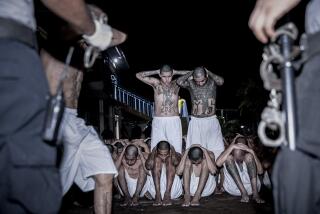A rights setback in China
- Share via
BEIJING — China’s human rights environment deteriorated significantly across a broad range of areas in 2006 as the government imposed stricter controls over the media, academia, the legal community and civic groups, Human Rights Watch says in a report released Thursday.
The New York-based group adds that hopes of President Hu Jintao emerging as a reformer have been dashed. Legal reforms have stalled, an aggressive censorship regime remains and authorities have continued their long-standing campaigns against Christian, Tibetan and Xinjiang groups, Human Rights Watch reports.
“The Chinese government continues to use a vast police and state security apparatus to enforce multiple layers of controls on critics, protesters and civil society activists,” the organization says in the China section of its annual world report. “Such controls make actual arrests -- which draw unwanted international attention -- less necessary in silencing critics.”
Beijing did not immediately react to the report. Previously, however, it has condemned Human Rights Watch for what it terms the group’s prejudice against China and its people and disregard for the reality in the country.
“Its annual reports always patch together claims out of thin air that are entirely politically motivated,” a Foreign Ministry official said last year in response to the group’s 2005 report.
Liu Wenzong, a director with the government-funded China Society for Human Rights Studies, echoed Beijing’s view Thursday and said the nongovernmental organization’s work was part of a Western pattern of exaggeration that overlooks China’s many human rights advances.
And the United States is not blameless, he said.
“The U.S. talks about human rights, but Bush overthrew the Iraq government without a good reason, then hanged a state leader at will,” Liu said. “Tens of thousands of Iraqis have now died in vain. Why don’t human rights groups run after that issue?”
Other Chinese, however, said the Western group raised several valid points, including China’s stepped-up persecution of lawyers who represent protesters, the use of vaguely defined charges to detain suspects and the settling of legal cases based on political considerations.
“Our human rights have deteriorated in 2006,” said Pu Zhiqiang, an attorney at the Beijing Huayi Law Firm. “Media controls are very strict. And while anticorruption measures have attracted lots of attention, these are mainly about power struggles. Real anticorruption complaints by ordinary citizens are suppressed.”
A few urban intellectuals are testing China’s limits on free speech and human rights, but many ordinary Chinese agree with the government that too many Western-style freedoms and too much expression could undermine stability. China continues to grapple with the problem of growing unrest. In August, the Ministry of Public Security said there were 39,000 cases of “public order disruptions” in the first six months of 2006, quadruple the level of 10 years ago.
According to Thursday’s report, the Chinese government shut down more than 700 Internet discussion forums during the first half of 2006 and forced eight search engines to filter requests based on a keyword list of 10,000 words.
Pu and Hu Xingdou, a professor at the Beijing Institute of Technology, said their names were temporarily blocked by Chinese Internet filters last year.
“I think some filtering is necessary,” said Hu, citing the banned spiritual movement Falun Gong, which Beijing has condemned as a cult.
Yin Lijin of The Times’ Beijing Bureau contributed to this report.
More to Read
Sign up for Essential California
The most important California stories and recommendations in your inbox every morning.
You may occasionally receive promotional content from the Los Angeles Times.













